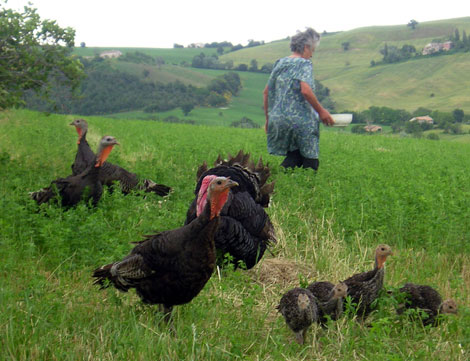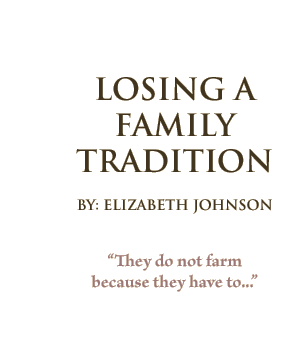| Emo and Elsa Catena work 15 hours a day on their
farm, but they fear that the rural Italian way of life that they
love is dying. They suspect that they
will be the last members of their family to farm.
“They do not farm because they have to; they do it because
they truly love it. It is what brings them satisfaction in life,”
said their daughter Daniela, 37.
The Catena farm has been in the family for over 100 years. “At
one point in time, maintaining a farm was a group effort; everyone
in the family was focused primarily on the farm duties,” Emo
said.
That changed when Daniela and her brother, Alfio, 46, were children
and began attending school. “To keep us from doing so [attending
school] would be to deprive us of a normal life,” Daniela
said.
Once the children were old enough to decide what they wanted to
do with their future, both left the farm for jobs in Cagli. Emo
and Elsa continued to run the farm on their own.
The Catenas’ day begins at 6 a.m. and stays busy until after
8 p.m. They start by feeding and herding the animals. Chickens,
turkeys, hens, ducks, geese,
rabbits, sheep, cows, bulls, and dogs must be attended to. They
farm 200 acres of land, most of which is hay.
Until the late ’70s the family did not have tractors, and
there is still a great deal of manual work. Aside from the daily
upkeep of the land, the Catenas make fresh cheese and meats, and
collect eggs to sell to numerous customers.
The cheese-making process alone takes hours a day. Elsa gathers
the sheep, milks them, filters the milk, adds enzymes and then forms
and filters the cheese to perfect it.
Farmers do not take time for the few
hours of pausa that most Italians enjoy each afternoon. Rather,
Elsa must concoct a special feed for the chickens and turkeys and
walk out into the fields to sit with them and feed them. Likewise,
Emo takes a pasta combination to feed the dogs: “Even the
animals eat pasta in Italy.”
They said that teamwork is necessary on the farm. Elsa juggled
raising children and strenuous farm work. She had to find time to
feed the family and care for the children in the midst of all her
other work.
“Emo and I are actually with each other very few times a
day — when we go to sleep at night, and when we wake up in
the morning.”
Daniela and Alfio often visit the farm and their parents. When
they do, they help with the farm work, but they have chosen not
to farm. The Catenas said that this is happening more and more often.
Both children work in farm-related jobs. Daniela works for Coopertiva
Agricola which tries to prevent foreign corporations from taking
over local farms by ensuring that local farmers are getting paid
properly. Alfio repairs tractors and other farm equipment.
The Catenas said the local government has tried to help local farmers
by subsidizing them. Even so, farming is declining.
“Few people are dedicated enough to want to farm anymore;
it just seems that there is no way to solve this problem,”
Elsa said. “We older people are going to die soon. When that
happens, the farms will die also. The work is too hard, and no one
wants to do it anymore.”
|



